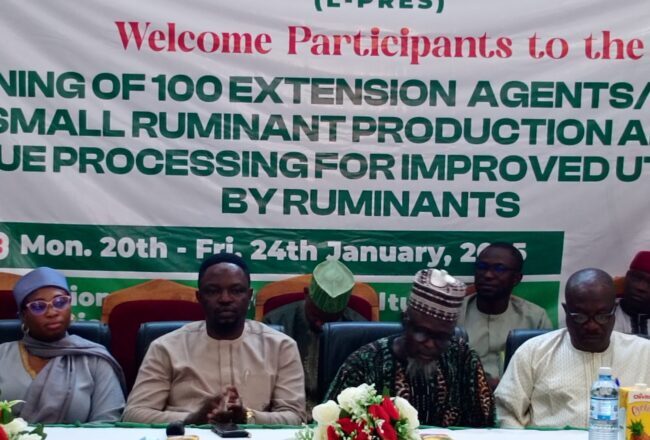Nigerian farmers have been encouraged to key into small ruminant production and crop residue processing for the use of ruminants to benefit from the monthly demand for one million goats by the Saudi Arabian government from Nigeria.
Speaking at the end of a five-day capacity training programme for an additional batch of 100 local farmers and extension agents in Kwara state, packaged by Synergy Impact Consultant Limited, the monitoring and evaluation officer of the Kwara state Livestock Productivity and Resilience Support Project (L-PRES), Hajia Kudirat Oyewo, said that Saudi Arabia recently signed a memorandum of understanding (MOU) with Nigeria for supply of one million goats to Saudi Arabia every month.
The eighth batch of the training programme, supported by the federal and state government, the World Bank and the L-PRES, made it a total of 800 farmers and extension agents trained so far on small ruminant production and crop residue processing for improved utilisation of ruminants.
The L-PRES officer, who lamented that, presently, Nigeria cannot meet the target signed in the MOU, said that the quantity of goats being produced in the country is not even enough for local consumption.
“Saudi Arabia signed a memorandum of understanding with Nigeria for the supply of one million goats to Saudi Arabia every month. Presently, Nigeria cannot meet the target. The quantity we have is not even enough for local consumption. So, this capacity training programme is going to help in realising the set objectives through the collaboration of the livestock farmers/extension agents.
“When an individual farmer contributes a certain number of goats that they can produce, the number will be aggregated among the farmers and the objectives would be achieved both for local and export purposes”, she said.
She also said that the training aimed at helping the farmers/extension agents to achieve three objectives of the projects: productivity, commercialization and crop residue processing for ruminant utilisation for sustainable livestock feeding.
Also speaking, the state L-PRES coordinator, Soji Oyawoye, represented by Mallam Nureni Razaq, expressed optimism that knowledge, skills and confidence gained by the participants from a team of facilitators from the Dryland Agriculture, Kano, would help them to implement the agricultural practices in their respective communities.
Oyawoye said, “As you return to your communities, I urge you to share the knowledge and skills you have acquired with your farmers, colleagues, friends, and family members. Remember, the success of this programme depends on your ability to apply what you have learned and to inspire others to do the same.
“You are now part of a network of professionals who are committed to improving small ruminants
production and crop residue processing in Nigeria.
“I have no doubt that you will make a positive impact in your communities.
“I would like to extend my special appreciation to our funding partners, the World Bank through the L-PRES, our able and dynamic Governor Abdulrahman Abdulrazaq for funding the project, Kwara state Commissioner for Agriculture and Rural Development, Mrs Oloruntoyosi Thomas. Your investment in the lives of these extension agents and farmers will have a lasting impact on the livestock sector in Kwara and Nigeria as a whole.”
ALSO READ FROM NIGERIAN TRIBUNE
Insecurity causing agricultural decline, farmers displacement, poor yield – Abbas









